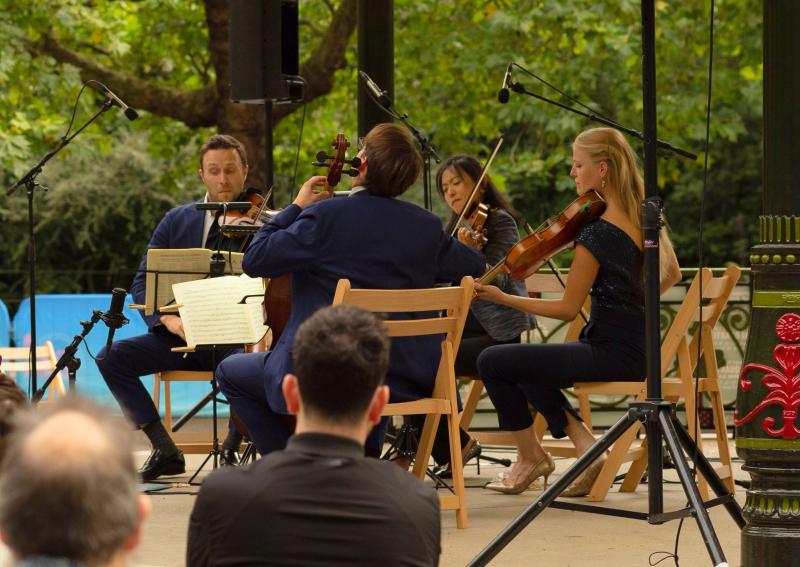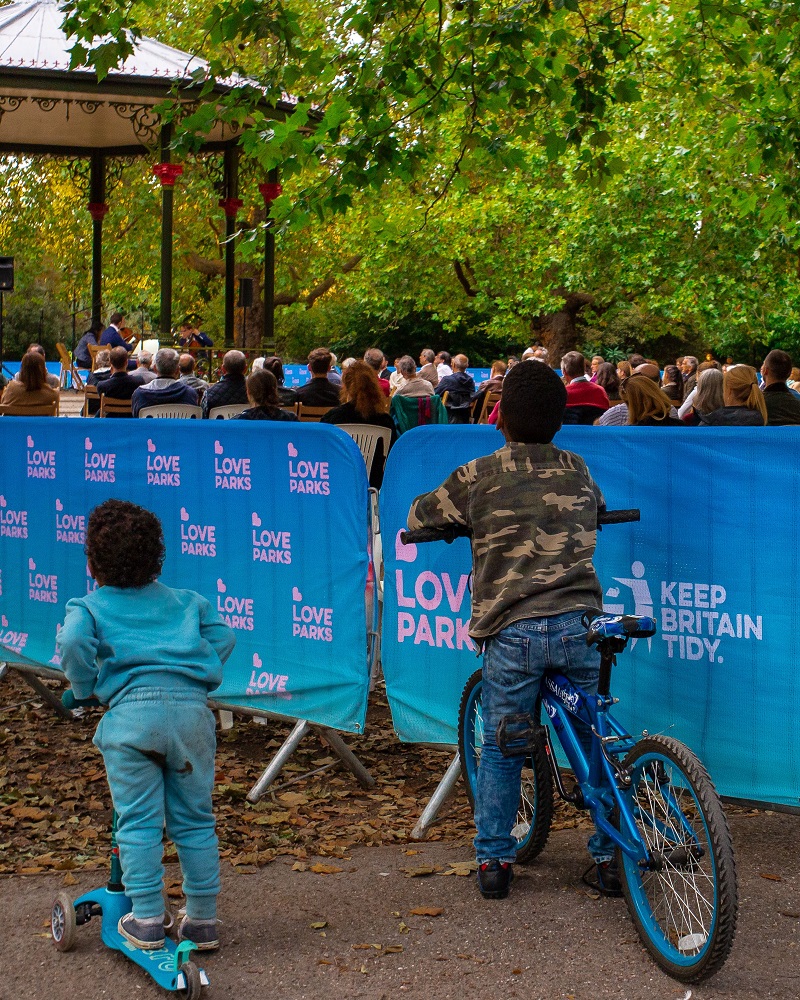Doric Quartet, Bandstand Chamber Festival, Battersea Park review – radiance on a late summer evening | reviews, news & interviews
Doric Quartet, Bandstand Chamber Festival, Battersea Park review – radiance on a late summer evening
Doric Quartet, Bandstand Chamber Festival, Battersea Park review – radiance on a late summer evening
Back before an audience at last, top players engage at the highest level

Wonderful as the livestreamed Proms are for players working together again and for viewers/listeners who wouldn’t be able to get to the Royal Albert Hall even if they could be admitted, I’d sacrifice them all for one evening of live musical communication like this.
First praise must go to clarinettist Anthony Friend. Like him, I’d wandered through the heart of Battersea Park, in my case for the first time, on a lockdown afternoon, seen the handsomely repainted bandstand in a grove of London planes and thought what a wonderful venue it would make for chamber music. But he acted, putting together a series of chamber concerts which the support of Wandsworth Council and various generous benefactors made possible.
 Love Parks, as the aegis goes? Totally, at a peaceful time with the background of the occasional dog barks, baby gurgles (the delightful one behind me pictured left), brief stereophonic shrieks of ring-necked parakeets and the gentle thud of passing joggers. A helicopter loomed before the miraculously natural Andante of Mendelssohn’s E minor Quartet, just in time for the players to hold fire before rippling along in the perfect serene expression of the occasion, quickened to life before returning to the source.
Love Parks, as the aegis goes? Totally, at a peaceful time with the background of the occasional dog barks, baby gurgles (the delightful one behind me pictured left), brief stereophonic shrieks of ring-necked parakeets and the gentle thud of passing joggers. A helicopter loomed before the miraculously natural Andante of Mendelssohn’s E minor Quartet, just in time for the players to hold fire before rippling along in the perfect serene expression of the occasion, quickened to life before returning to the source.
Of course senses are heightened to the wonders of quartet dialogue at a time like this, especially when Mozart makes his lines so very vocal (cellist John Myerscough made special magic from the melody line of the Larghetto, moving effortlessly to the heights; this is a quartet which so often seems to want to touch the sky). The surprises in such a fluent context were all the greater: the sudden buffeting of the first movement development, with a welcome repeat, the sudden halt and radical harmonies of the minuet’s trio, Mozart’s longest. But all was righted in the sheer delight of the finale.
 For contrast, the Dorics chose one of the three Mendelssohn quartets out of the six in a minor key, the E minor, Op. 44 No. 2. His very last, Op. 80, is a lacerating tragedy, composed after the death of his beloved sister Fanny and shortly before his own. But here the happy Felix is never far from the scene; a chorale-like theme rises from the turbulence of the first movement, seamlessly so in the Dorics’ performance, while the typically original and spirit-of-delightish scherzo and aforementioned slow movement seem imperturbably joyful (though shades flit across the Allegro di molto).
For contrast, the Dorics chose one of the three Mendelssohn quartets out of the six in a minor key, the E minor, Op. 44 No. 2. His very last, Op. 80, is a lacerating tragedy, composed after the death of his beloved sister Fanny and shortly before his own. But here the happy Felix is never far from the scene; a chorale-like theme rises from the turbulence of the first movement, seamlessly so in the Dorics’ performance, while the typically original and spirit-of-delightish scherzo and aforementioned slow movement seem imperturbably joyful (though shades flit across the Allegro di molto).
How the finale will end is anyone’s guess; in the minor, as it turns out, but it could so easily go either way. At any rate we were in no mood for real tragedy last night. Just as I’ll never forget hearing the final quartet for the first time from the Calidore Quartet at the East Neuk Festival, rain wind-driven against Kilrenny Church's windows, this supreme concert will for ever lodge in the memory alongside its surrounding trees and setting sun. I can’t wait for the next in the series. Tickets are free, but you need to book; if you're unsuccessful, you can stand around the edges or sit on one of the benches - the well-handled amplification will make sure you hear all the subtleties. Utopia in a London park.
- In the next event, on Friday 4 September, the Maggini Quartet plays Beethoven and Dvořák. Full details here
- More classical reviews on theartsdesk
rating
Explore topics
Share this article
The future of Arts Journalism
You can stop theartsdesk.com closing!
We urgently need financing to survive. Our fundraising drive has thus far raised £49,000 but we need to reach £100,000 or we will be forced to close. Please contribute here: https://gofund.me/c3f6033d
And if you can forward this information to anyone who might assist, we’d be grateful.

Subscribe to theartsdesk.com
Thank you for continuing to read our work on theartsdesk.com. For unlimited access to every article in its entirety, including our archive of more than 15,000 pieces, we're asking for £5 per month or £40 per year. We feel it's a very good deal, and hope you do too.
To take a subscription now simply click here.
And if you're looking for that extra gift for a friend or family member, why not treat them to a theartsdesk.com gift subscription?
more Classical music
 BBC Proms: A Mass of Life, BBCSO, Elder review - a subtle guide to Delius's Nietzschean masterpiece
Mark Elder held back from blasting the audience with a wall of sound
BBC Proms: A Mass of Life, BBCSO, Elder review - a subtle guide to Delius's Nietzschean masterpiece
Mark Elder held back from blasting the audience with a wall of sound
 BBC Proms: Le Concert Spirituel, Niquet review - super-sized polyphonic rarities
Monumental works don't quite make for monumental sounds in the Royal Albert Hall
BBC Proms: Le Concert Spirituel, Niquet review - super-sized polyphonic rarities
Monumental works don't quite make for monumental sounds in the Royal Albert Hall
 Frang, Romaniw, Liverman, LSO, Pappano, Edinburgh International Festival 2025 review - sunlight, salt spray, Sea Symphony
Full force of the midday sea in the Usher Hall, thanks to the best captain at the helm
Frang, Romaniw, Liverman, LSO, Pappano, Edinburgh International Festival 2025 review - sunlight, salt spray, Sea Symphony
Full force of the midday sea in the Usher Hall, thanks to the best captain at the helm
 Elschenbroich, Grynyuk / Fibonacci Quartet, Edinburgh International Festival 2025 review - mahogany Brahms and explosive Janáček
String partnerships demonstrate brilliant listening as well as first rate playing
Elschenbroich, Grynyuk / Fibonacci Quartet, Edinburgh International Festival 2025 review - mahogany Brahms and explosive Janáček
String partnerships demonstrate brilliant listening as well as first rate playing
 BBC Proms: Akhmetshina, LPO, Gardner review - liquid luxuries
First-class service on an ocean-going programme
BBC Proms: Akhmetshina, LPO, Gardner review - liquid luxuries
First-class service on an ocean-going programme
 Budapest Festival Orchestra, Iván Fischer, Edinburgh International Festival 2025 review - mania and menuets
The Hungarians bring dance music to Edinburgh, but Fischer’s pastiche falls flat
Budapest Festival Orchestra, Iván Fischer, Edinburgh International Festival 2025 review - mania and menuets
The Hungarians bring dance music to Edinburgh, but Fischer’s pastiche falls flat
 Classical CDs: Hamlet, harps and haiku
Epic romantic symphonies, unaccompanied choral music and a bold string quartet's response to rising sea levels
Classical CDs: Hamlet, harps and haiku
Epic romantic symphonies, unaccompanied choral music and a bold string quartet's response to rising sea levels
 Kolesnikov, Tsoy / Liu, NCPA Orchestra, Chung, Edinburgh International Festival 2025 review - transfigured playing and heavenly desire
Three star pianists work wonders, and an orchestra dazzles, at least on the surface
Kolesnikov, Tsoy / Liu, NCPA Orchestra, Chung, Edinburgh International Festival 2025 review - transfigured playing and heavenly desire
Three star pianists work wonders, and an orchestra dazzles, at least on the surface
 BBC Proms: Láng, Cser, Budapest Festival Orchestra, Iván Fischer review - idiomatic inflections
Bartók’s heart of darkness follows Beethoven’s dancing light
BBC Proms: Láng, Cser, Budapest Festival Orchestra, Iván Fischer review - idiomatic inflections
Bartók’s heart of darkness follows Beethoven’s dancing light
 Weilerstein, NYO2, Payare / Dueñas, Malofeev, Edinburgh International Festival 2025 review - youthful energy and emotional intensity
Big-boned Prokofiev and Shostakovich, cacophonous López, plus intense violin/piano duo
Weilerstein, NYO2, Payare / Dueñas, Malofeev, Edinburgh International Festival 2025 review - youthful energy and emotional intensity
Big-boned Prokofiev and Shostakovich, cacophonous López, plus intense violin/piano duo
 theartsdesk at the Three Choirs Festival - Passion in the Cathedral
Cantatas new and old, slate quarries to Calvary
theartsdesk at the Three Choirs Festival - Passion in the Cathedral
Cantatas new and old, slate quarries to Calvary

Add comment